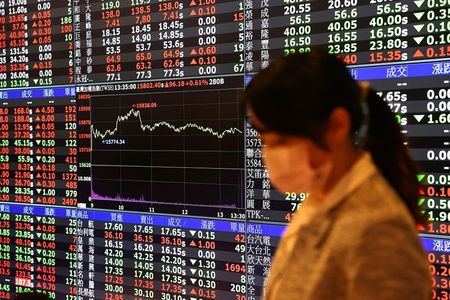By Ambar Warrick
Investing.com-- Most Asian stock markets tumbled further on Monday as traders exited risk-driven assets on fears that rising interest rates and high inflation could trigger a global economic recession.
Bourses in South Korea, Japan, and Taiwan were the worst hit, sinking between 2% and 3%, extending losses from last week.
India’s bluechip Nifty 50 index dropped 1.6% to a near one-month low, while Hong Kong’s Hang Seng index fell 1.1% to an 11-year low.
Regional stocks broadly tracked a steep selloff on Wall Street last week, sparked by hawkish signals from the Federal Reserve and after a slew of weak European and UK business activity data.
The Bank of England also hiked interest rates, and warned that the UK economy may already be in recession.
The dollar surged to new 20-year highs, while U.S. Treasury yields also rose, indicating that market sentiment was broadly risk-off. High yield, high-risk stocks and currencies all saw steep declines on Monday.
Concerns over slowing growth in Asia also persisted. The Chinese government raised the foreign exchange risk reserve requirements for financial institutions to stem a drop in the yuan, making it more expensive for traders to short the currency.
China’s bluechip Shanghai Shenzhen CSI 300 index fell 0.5%, while the Shanghai Composite index lost 1.2%. Both indexes were trading at their lowest level in over five months.
Japan’s Nikkei 225 index fell 2.7%, as data showed that Japanese business activity grew slightly in September. But the outlook for the Japanese economy remained pressured by high inflation and a weakening yen.
Japan’s manufacturing sector also grew at its slowest pace in nearly two years.
Thailand’s SET Index was the worst performer in Southeast Asia, down 0.9%.
Asian stocks have tumbled in value this year as concerns over an impending recession drove capital away from risk-driven assets. Tighter monetary conditions, triggered by a slew of interest rate hikes in the region, have also weighed on stock markets.
